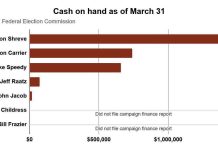A Bartholomew County juvenile magistrate is considering whether an Edinburgh teen should be declared delinquent for drawing a scene of his alternative school classroom in which his teacher and fellow students were identified by name as being shot.
Magistrate Heather Mollo heard about two-and-a-half hours of testimony Friday in Bartholomew Juvenile Court from school personnel, students who were in the classroom at Simon Youth Academy in Edinburgh and the 16-year-old juvenile who is charged with intimidation in the case.
Mollo told the juvenile, his mother and their attorney, Michael DeArmitt, that she would weigh the testimony before making a ruling on whether to declare the teen delinquent and then set a hearing to determine disposition of his case, or whether to declare him not delinquent and drop the case.
One of the most chilling statements during Friday’s testimony came from the teacher who supervises the alternative school classroom located in the Edinburgh Premium Outlets shopping center.
The teacher, Keith Witty, said when the juvenile showed him the sketch during class on Feb. 21, the juvenile told Witty not to worry — he had only grazed my head, in the sketched shooting, the teacher testified.
“He said he wanted someone alive to tell the story of what happened,” Witty said.
Two other female teens who were students in the room said they were concerned when the accused juvenile showed one of them the drawing. One of the female students told the juvenile he needed to show it to Witty, which he did.
The 16-year-old, a high school sophomore, is also accused of showing the sketch of the shooting scene to some of his classmates, a scene which includes bodies identified by student and teacher names with arrows pointing to their bodies with the words “dead,” and a drawing of a semi-automatic pistol.
He is one of three teens who are being prosecuted in Bartholomew County for school threats made on Feb. 20 or Feb. 21, a week after a fatal school shooting in Parkland, Florida. One of the other teens charged in a threat at Columbus East High School has had his charges modified to a misdemeanor and the hearings in that case are no longer public.
A second former Columbus East student case remains as a felony intimidation charge, with a fact-finding hearing, which is similar to a trial, set for Aug. 24 in juvenile court.
Incident details shared
On Friday, the juvenile testified in his own defense at the end of the hearing, telling Mollo he had arrived at the youth academy a few minutes early, and entered the area where the alternative school was located, but had to wait for Witty to unlock the classroom doors before he could enter.
He said he sat at Witty’s table with three other female students and worked on an Algebra 2 online course when he heard two of the girls talking and laughing about the Parkland shooting and the scenarios of what would happen if it occurred at their school.
The juvenile said he didn’t talk to them but picked up a piece of notebook paper and started imagining it and drawing it. He said he did not intend it to be a threat, telling the judge, “I don’t think about things I do before I do them.”
Earlier in the hearing, testimony was given that the juvenile has been diagnosed as emotionally disabled, bipolar and suffers from ADHD and mood regulation disorder.
Witty testified that when he was shown the sketch, he went to his computer and sent an email to Edinburgh High School administrators saying he needed assistance, and Edinburgh High School Assistant Principal Jason Schoettmer arrived about 10 minutes later.
Schoettmer testified the juvenile is familiar with him since he handles discipline for Edinburgh High School. Shortly after Schoettmer’s arrival, the juvenile asked to go to the restroom, which is only accessed outside the classroom. Witty allowed him to leave.
The two men found two of the juvenile’s drawings in the classroom’s trash can, one saying, “I cut myself,” and another the sketch of the shooting, both of which Schoettmer put in his pocket and later gave to Edinburgh police.
“They were pointless,” the juvenile testified about the drawings and their meaning. “They meant nothing to me.”
When the juvenile didn’t immediately return to the class, Witty went to check on him and told him he needed to get back to class.
However, the juvenile didn’t go back to class and left his belongings there, waiting until class was over by about five minutes and then going to the parking lot where his mother picked him up, according to his testimony. Edinburgh police arrested the juvenile later that day.
The juvenile testified that after he showed the sketch to the girls in the classroom, they went back to talking and laughing about the Parkland shooting.
“They went back to having a perfectly fine day,” he said of the girls’ reactions.
Actions questioned
DeArmitt noted several times during the hearing that school officials were not so concerned about the sketch incident that they called 911 or evacuated the school when the drawing was shown.
He also questioned Witty about why he would allow a student who had just drawn a sketch like that to leave the room unsupervised and go to a public restroom in the outlet mall, which was about to open to the public for the day.
Witty said he did not want to make a phone call in front of the students in the classroom, or leave the classroom to make a call, believing that could have put the students in more danger.
The teacher also mentioned that the classroom door locks automatically, so when the juvenile left, he would have had to request access back in. That did not become an issue because the juvenile didn’t return, he said.
When Schoettmer testified about the decision to allow the juvenile to leave the supervised area to go to an unsecure public restroom, he said, “If I had to do it over again, I’d do it differently.”
However, Schoettmer also said that previous interactions with the juvenile have shown that if either he or Witty had denied the juvenile’s request to go to the bathroom, that would likely have resulted in a negative reaction from the juvenile.
When asked outside the courtroom about how security had changed for the alternative school, Schoettmer declined to answer, saying the school security was being worked on and he would get into trouble if he talked about it.




